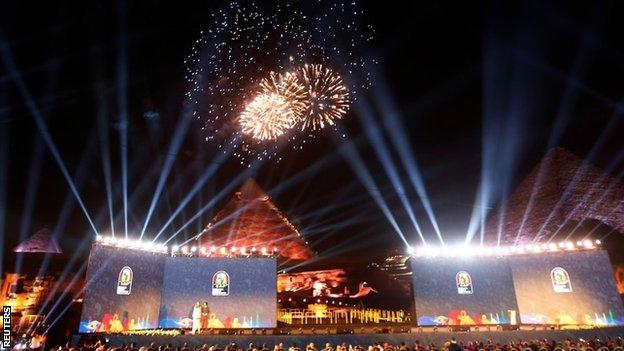Africa Cup of Nations: What to look out for in this summer's tournament
- Published
The Africa Cup of Nations gets under way on Friday, 21 June, when hosts Egypt face Zimbabwe.
BBC Sport takes a look at some of the things to keep an eye out for in the biggest ever, and first June-July Afcon.
Champions League winners among star attractions

All five BBC African Football of the Year 2018 nominees, including winner Mohamed Salah, are at Afcon 2019. From left, Medhi Benatia, Kalidou Koulibaly, Sadio Mane, Thomas Partey and Salah
There are plenty of star names on show in this summer's Africa Cup of Nations. Liverpool's Champions League winning forwards Mohamed Salah (Egypt) and Sadio Mane (Senegal) will be crucial to their countries' hopes.
That pair were joint top Premier League scorers this season along with another African - but Arsenal striker Pierre-Emerick Aubameyang's Gabon did not qualify.
Another Liverpool player, Naby Keita, is in Guinea's squad, even though he is still recovering from a thigh injury.
Algeria will be looking to Manchester City winger Riyad Mahrez for inspiration, while Morocco forward Hakim Ziyech comes into the tournament on the back of a 21-goal, 24-assist season with Ajax.
Ivory Coast's Lille forward Nicolas Pepe has been linked to several of Europe's top clubs after scoring 22 Ligue 1 goals. His international team-mate, Wilfried Zaha of Crystal Palace, is also courting interest.
Porto's Moussa Marega was the joint-third top-scorer in this season's Champions League with six - although he has only scored two goals in his Mali career so far.
Senegal's Napoli defender Kalidou Koulibaly is considered to be one of the best centre-backs in the world, while Ghana midfielder Thomas Partey is an Atletico Madrid regular.
Egypt, Senegal and Ghana are considered the three favourites to win the tournament.
New format, new timing... new everything?
This is the biggest Africa Cup of Nations ever with 24 teams, and the first to be played in Europe's summer.
The tournament is usually held in January and February, causing disputes with European clubs who had to release players in the middle of the season. But in July 2017 the Confederation of African Football decided the tournament would be played in June and July this year instead.
It also increased the tournament from 16 to 24 teams, in a similar format to Euro 2016, with the top four third-placed teams from the six groups also going into the last 16.
Egypt are hosting the Africa Cup of Nations for a fifth time. The Pharaohs are the most successful team in the tournament's history, winning seven times.
Pre-tournament turmoil

The draw took place in a glamorous location next to the Sphinx and pyramids in Giza
This is the fourth Africa Cup of Nations in a row to not be held in the country it was initially awarded to.
The hosting rights were taken off Cameroon - who are the defending champions - in November because of slow preparations and security concerns.
Egypt were named as the hosts in January, giving them five months to prepare. Three weeks later, the dates of the tournament were moved because of Ramadan, the Muslim holy month that involves abstaining from food and water from sunrise to sunset.
It was meant to run from 15 June to 13 July, but was moved to 21 June until 19 July, following requests from Morocco, Tunisia and Algeria - three of a record five Arab teams in this tournament.
Egypt and Mauritania are the others.
Some new faces
Helped by the expanded format, there are three new teams in this year's Africa Cup of Nations as Burundi, Madagascar and Mauritania play in the finals for the first time.
Burundi's most famous player to a European audience will be Stoke City striker Saido Berahino, the former England Under-21 player. The 25-year-old has scored one goal in five caps after declaring for the country of his birth in 2018.
They were drawn in the same group as Madagascar, whose manager Nicolas Dupuis is also the manager of French fourth-tier side Fleury, where he works with two of his international players as well as his fitness coach and goalkeeping coach.
Mauritania "achieved the impossible", one local journalist told the BBC, to get past Burkina Faso and Angola in qualifying.
One player likely to make his competitive debut at Afcon is Algeria's Andy Delort. The France-born Montpellier striker was a late replacement for Haris Belkebla, who was sent home after video footage emerged of the midfielder exposing his backside on a live gaming stream.
There will be plenty of players representing clubs not usually associated with major international tournaments. Uganda's Bevis Mugabe and Benin's Sessi D'Almeida were both relegated from the English Football League with Yeovil this season and released on free transfers.
Zimbabwe midfielder Alec Mudimu is a Welsh Premier League player with Cefn Druids and uncapped Tanzania striker Adi Yussuf played for Solihull Moors in the National League this season before moving to Blackpool.
FA Cup highlights: Blackpool 3-2 Solihull Moors
There are players based all over the world, including Romania, Cyprus, Israel, Thailand, Oman, China and Japan.
Several managers are going to the Africa Cup of Nations for the first time, including Netherlands and AC Milan legend Clarence Seedorf (Cameroon), Mexican Javier Aguirre (Egypt) and Briton Stuart Baxter (South Africa).
British-based players
There are 48 British-based players travelling to Egypt, including 26 who are contracted to 2018-19 Premier League clubs.
Egypt: Ahmed Elmohamady (Aston Villa), Ahmed Hegazi (West Brom), Mohamed Elneny (Arsenal), Mohamed Salah (Liverpool)
Uganda: Bevis Mugabi (Yeovil Town)
DR Congo: Arthur Masuaku (West Ham), Jacques Maghoma (Birmingham), Youssouf Mulumbu (Celtic), Britt Assombalanga (Middlesbrough), Yannick Bolasie (Everton)
Zimbabwe: Alec Mudimu (Cefn Druids), Tendai Darikwa (Nottingham Forest)
Nigeria: Leon Balogun (Brighton), John Mikel Obi (Middlesbrough), Wilfred Ndidi (Leicester), Oghenekaro Etebo (Stoke), Alexander Iwobi (Arsenal), Henry Onyekuru (Everton)
Guinea: Julian Jeanvier (Brentford), Ibrahima Cisse (Fulham), Naby Keita (Liverpool)
Burundi: Saido Berahino (Stoke)
Senegal: Cheikhou Kouyate (Crystal Palace), Idrissa Gueye (Everton), Sadio Mane (Liverpool)
Algeria: Adlene Guedioura (Nottingham Forest), Riyad Mahrez (Manchester City)
Kenya: Victor Wanyama (Tottenham Hotspur)
Tanzania: Abdi Yussuf Mussa (Blackpool)
South Africa: Kamohelo Mokotjo (Brentford)
Morocco: Romain Saiss (Wolves)
Ivory Coast: Serge Aurier (Tottenham), Jean-Michael Seri (Fulham), Wilfried Zaha (Crystal Palace), Jonathan Kodjia (Aston Villa)
Namibia: Ryan Nyambe (Blackburn)
Mali: Molla Wague (Nottingham Forest), Lassana Coulibaly (Rangers)
Ghana: Andy Yiadom (Reading), Christian Atsu (Newcastle), Thomas Agyepong (Manchester City), Jordan Ayew (Crystal Palace)
Cameroon: Gaetan Bong (Brighton), Andre-Frank Zambo Anguissa (Fulham), Arnaud Djoum (Hearts)
Benin: Sessi D'Almeida (Yeovil), Steve Mounie (Huddersfield)
Guinea-Bissau: Marcelo Djalo (Fulham)
Africa Cup of Nations groups
Group A: Egypt, DR Congo, Uganda, Zimbabwe
Group B: Nigeria, Guinea, Madagascar, Burundi
Group C: Senegal, Algeria, Kenya, Tanzania
Group D: Morocco, Ivory Coast, South Africa, Namibia
Group E: Tunisia, Mali, Mauritania, Angola
Group F: Cameroon, Ghana, Benin, Guinea-Bissau